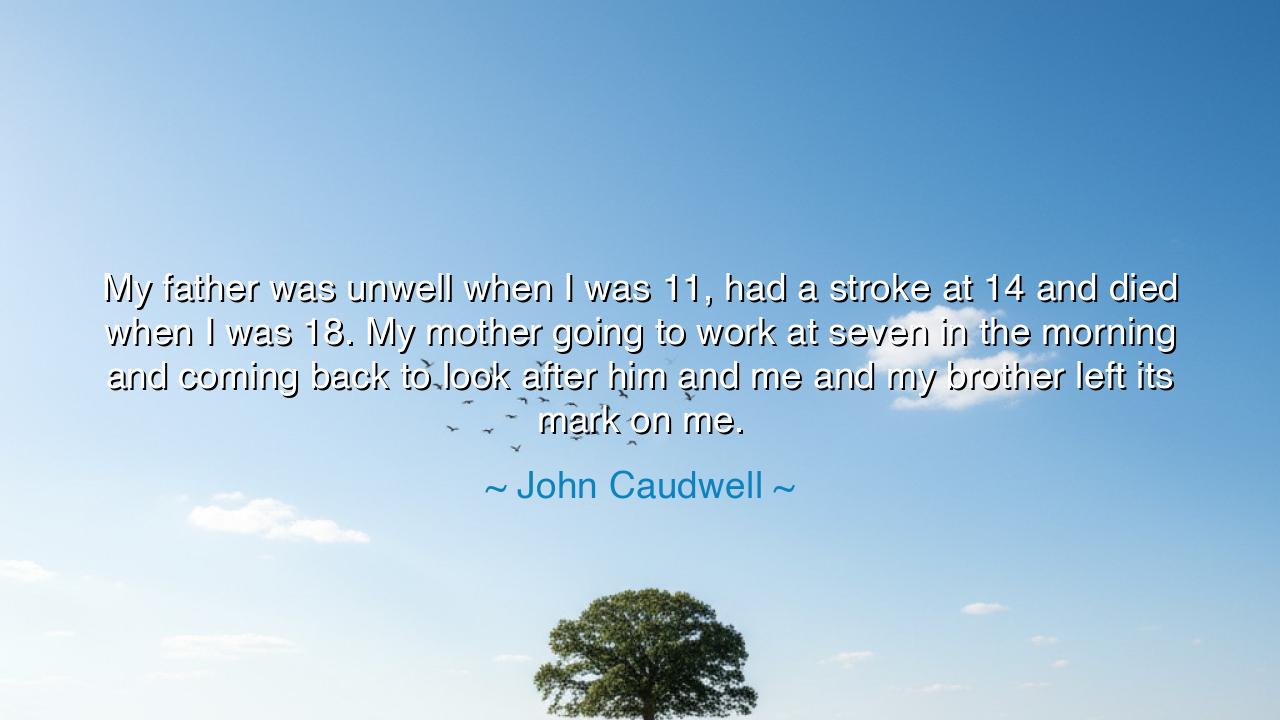
My father was unwell when I was 11, had a stroke at 14 and died
My father was unwell when I was 11, had a stroke at 14 and died when I was 18. My mother going to work at seven in the morning and coming back to look after him and me and my brother left its mark on me.






"My father was unwell when I was 11, had a stroke at 14 and died when I was 18. My mother going to work at seven in the morning and coming back to look after him and me and my brother left its mark on me." These words by John Caudwell paint a picture of profound sacrifice, resilience, and the transformative impact of early adversity. Caudwell's reflection on his childhood, shaped by his father's illness and his mother’s tireless efforts, reveals how hardship and duty leave an indelible mark on a person's character. His words offer a glimpse into the emotional and psychological effects of growing up in the shadow of illness and the weight of responsibility that often falls on the shoulders of the young.
In the ancient world, familial duty and sacrifice were seen as essential virtues. The Romans held the concept of pietas in high regard—a sense of duty not just to the gods, but to family, country, and community. For the Romans, this sense of responsibility was seen as foundational to character and the moral fiber of society. John Caudwell’s story mirrors this ancient understanding of the duty to family. His mother's unwavering commitment to both care for her ill husband and raise her children while working outside the home reflects the spirit of pietas, showing how deep sacrifices can shape one's values and outlook on life.
Consider the tale of Antigone, the daughter of Oedipus, in Greek tragedy. Antigone’s decision to bury her brother, despite the edict of King Creon, demonstrates a profound commitment to family duty and honor. Like Caudwell’s mother, Antigone put the needs of her family above all else, defying the law to perform a sacred familial responsibility. This act, though tragic, reveals the deep moral imperative that can drive a person in times of adversity. For Antigone, as for Caudwell, the challenges they faced, although immense, became the foundation for their moral and emotional growth.
In more recent history, we see similar sacrifices in the life of Mahatma Gandhi, who, though known for his leadership in India’s independence movement, also had a deeply personal connection to the concept of family responsibility. Gandhi's mother, Putlibai, was an example of quiet sacrifice, nurturing Gandhi with profound devotion. Despite facing many challenges, Gandhi carried the lessons of duty, selflessness, and resilience into his adult life. His personal experiences of seeing his mother’s sacrifices shaped his philosophy of non-violence and compassion. Caudwell’s mother, like Gandhi’s, imparted the deep lesson that duty to others, especially family, shapes not just a person's character, but their values and approach to the world.
The lesson in Caudwell’s words is one of immense strength and compassion. Growing up in the midst of such hardship left him with a clear understanding of what it means to sacrifice for others, to shoulder responsibility, and to find meaning in the face of suffering. His mother’s ability to balance work, caregiving, and raising children shows the importance of resilience in the face of adversity. It is through these moments of hardship that we often find our deepest purpose, not just in caring for others, but in honoring their sacrifices by living a life aligned with the values they instilled in us.
In our own lives, we can take this wisdom to heart. Like Caudwell’s mother, we may find ourselves in positions where sacrifice is necessary, but these moments, though painful, shape us into stronger and more compassionate individuals. Whether through caring for loved ones, providing for our families, or facing personal challenges, the trials we endure often become the very foundation for our growth and character. Sacrifice, while difficult, teaches us that love and duty are the true guiding forces that propel us forward, helping us find meaning even in the hardest of times.
Thus, let us reflect on the sacrifices made by those around us, like Caudwell’s mother, and recognize that such acts of duty are not just about the tasks performed but the values they impart. In moments of hardship, we too must remember the power of resilience and compassion. Like the ancients who honored their families and responsibilities, we must also honor the sacrifices made in our lives, knowing that in selflessness, we discover the strength to endure and to grow.






AAdministratorAdministrator
Welcome, honored guests. Please leave a comment, we will respond soon